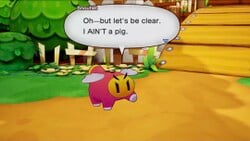Snoutlet: Difference between revisions
From the Super Mario Wiki, the Mario encyclopedia
Jump to navigationJump to search
Nintendo101 (talk | contribs) (We do not know if Snoutlet is the same species as Connie - for all we know there are multiple races in the game based on power outlets.) |
(→Names in other languages: He says he's not a pig) Tags: Mobile edit Advanced mobile edit |
||
| Line 33: | Line 33: | ||
{{M&LB}} | {{M&LB}} | ||
[[Category:Allies]] | [[Category:Allies]] | ||
[[Category:Mario & Luigi: Brothership characters]] | [[Category:Mario & Luigi: Brothership characters]] | ||
Revision as of 11:16, June 23, 2024
This article is about a subject in an upcoming or recently released game. When the game is released, or more information about this subject is found, this article may need major rewriting.
This notice should be removed after a month has passed since the game was first released.
| Snoutlet | |
|---|---|
 Snoutlet from Mario & Luigi: Brothership. | |
| Species | Winged Concordian creature |
| First appearance | Mario & Luigi: Brothership (2024) |
- “Oh—but let's be clear. I AIN'T a pig.”
- —Snoutlet, Mario & Luigi: Brothership
Snoutlet is a major character from Mario & Luigi: Brothership. He is a flying piggy bank-like creature who acts as Mario and Luigi's advisor throughout their adventure in Concordia where he resides. His role seems to be similar to Starlow from previous Mario & Luigi titles as the brothers' primary companion. His name is a portmanteau of "snout", referring to a pig's nose, and "outlet", which refers to an electrical output socket.
Gallery
Names in other languages
| Language | Name | Meaning | Notes |
|---|---|---|---|
| Japanese | タッブー[?] Tabbū |
Play of「タップ」(tappu, "tap"), a reference to table tap, and「ブーブー」(būbū, onomatopoeia for oinking); also from a backward spelling of「 |
|
| Dutch | Trufvolt[?] | Portmanteau of truffel ("truffle"), likely referring to truffle hogs, and "volt" | |
| French (NOE) | Couchomb[?] | Portmanteau of cochon ("pig") and "coulomb" | |
| German | Wattz[?] | From "Watt" (a unit of power) and possibly the surname suffix -witz | |
| Italian | Presus[?] | Latin form of presa ("outlet") | |
| Portuguese | Plugue[?] | From pligue ("outlet") | |
| Spanish (NOE) | Porcopolo[?] | Portmanteau of puerco ("pig") and "Marco Polo" |
